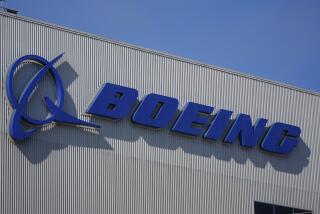FedEx cancels order for jets from Airbus
FedEx Corp. said Tuesday that it had canceled its multibillion-dollar order for freighter versions of the Airbus A380, becoming the first customer to give up on the super-jumbo jet, which has been beset by production delays.
FedEx compounded the pain for the European plane maker, saying it would instead buy 15 wide-body jets from Airbus archrival Boeing Co. The order is potentially valued at $3.6 billion, based on list prices for the 777; FedEx’s original commitment for 10 A380s was valued at $2.3 billion at the time they were ordered in 2001.
Boeing shares rose $4.37, or 5.4%, to $84.85, and the stock of Airbus parent European Aeronautic Defense & Space Co. slumped more than 3% in European trading.
“With the significant delays in deliveries of the A380, it was a prudent business decision for us to fill our customers’ needs with the 777,” said Maury Lane, a spokesman for FedEx.
FedEx, the world’s largest air cargo carrier, said it also would take options to purchase 15 more 777 freighters, a signal that it was committed to Boeing aircraft for the foreseeable future.
Boeing, based in Chicago, is currently completing the design for its freighter version, which is expected to enter service in 2009.
United Parcel Service Inc., the second major customer for the A380 freighters, said it was reviewing its order but had not made a decision about its status. Analysts said a second cancellation could prompt Airbus to pull the plug on the A380 freighter version.
“It’s turning into a disaster for Airbus and a pretty hefty benefit for Boeing,” said Paul H. Nisbet, an aerospace analyst for JSA Research Inc. in Newport, R.I.
Airbus, based in Toulouse, France, is developing a passenger version of the A380 that would have on average 555 seats, making it the world’s largest airliner, and a freighter version that is being sold to cargo carriers.
Last month Airbus said the first A380, a passenger version, would not be available until October 2007 -- more than 18 months behind its original schedule -- because of problems in installing electrical wiring. Some airlines can expect delays of more than two years beyond the dates they were initially promised deliveries, Airbus said.
The latest delay, the third in a year, angered carriers and prompted threats of cancellations. The production woes have led to two major management shake-ups at Airbus, including the replacement of its chief executive, and have caused political rifts and finger pointing among the four European countries that are home to the company’s 16 major manufacturing facilities.
The FedEx cancellation will help Boeing extend its lead over Airbus in orders this year, as the U.S. company seeks to finish ahead of its European rival for the first time since 2000. And the loss of the FedEx order is likely to make it more difficult for Airbus to turn a profit on the A380, considered its flagship program.
Airbus has said that because of added costs resulting from the production problems, it would need to sell 420 of the planes to break even, up from its initial estimates of 250. Each A380 costs about $285 million at current prices, although major airlines receive substantial discounts. About 100 suppliers in Southern California make parts for the A380.
Scott Hamilton, an aviation consultant with Leeham Co. in Issaquah, Wash., said the revised break-even estimates, coupled with the FedEx cancellation, would mean that Airbus would be unlikely to start making money on the program until the fourth quarter of 2017.
FedEx’s decision to purchase 777s marked the first tangible benefit for Boeing from Airbus’ troubles.
With the FedEx purchase, Boeing will have 38 orders for the 777F, the freighter variant of the popular passenger model. Boeing has sold 866 777s in all; Airbus has sold 149 A380s.
FedEx Chairman Frederick W. Smith said in a statement that it was necessary for the company to make the switch, considering that “global demand for air cargo and express services continues to grow rapidly.”
With the production delays, FedEx said, it would not have received its first A380 until 2010, or nearly two years behind its original plans to put the aircraft into service. By purchasing the 777s, FedEx will be able to begin operating four of the airplanes in 2009 and eight in 2010.
“We get them a year earlier,” spokesman Lane said.
FedEx operates 660 airplanes, giving it the world’s second-largest fleet, behind that of AMR Corp.’s American Airlines.
More to Read
Inside the business of entertainment
The Wide Shot brings you news, analysis and insights on everything from streaming wars to production — and what it all means for the future.
You may occasionally receive promotional content from the Los Angeles Times.










